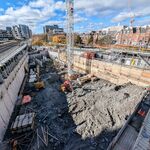There are two options to go with for the pre-construction condo.
1. consult with the mortgage specialist introduced on site. Most projects / builders will engage a typical bank (mortgage specialist) attached to the project. In common deal you can get your rate capped up to 42 months (usually 36 months). The advantage is the long term that you are able to cap but you have no choice to shop around
2. to consult each of the banks but usually the branches only have the 90 - 120 days that they can cap the rate for you
You can actually do both to cap it with a long term first and then shop around when you are told when to expect the occupancy.
Mind you though the occupancy date to closing date it may take up to half a year. Say you have capped your rate for 36 months since Jan 1/2010 then by the end of 2013 it will expire. You will need to make good estimate the likelihood your building will get delayed after then. It happened to people in my building they have lost the good rate they capped after the 36 months due to a couple of delays. I am not sure how to avoid this, I assume you can cap another one after one year passed just in case? Back then I have waited and lucky enough mine was still within the 36 months although it was a bit higher than the earlier rate.
In my view, the "special" bank mortgage financing available from a bank that has partnered with the developer is a bit of a mirage which helps the developer and the bank more than it does the buyer. I think it really exists in order to:
1) eliminate one of the barriers to buying, by providing the buyer with a (false) sense of security of what their mortgage costs will be down the road when they need the mortgage. Of course, the guarantee period has usually expired by then and a new rate prevails;
2) serve as a filter so that the developer knows that the buyer is financially worthy and is in a position to be able to close the deal. When you provide your financial info to the bank to determine your eligibility for a mortgage pre-approval, they ascertain your credit worthiness, and your developer wants this info;
3) provide the partnering bank with contact names for everyone in the building so that they can follow up to try and enter into a mortgage with them. A good way of getting leads;
In my case, in 2005 RBC (which had partnered with my developer to provide guaranteed pre-approval rates) gave me a rate that they would guarantee for 24 months. Because of rezoning/OMB delays, it is now four years later and my building is still not complete and the guarantee period has long since passed. Although this might be an extreme example, I think that you would be hard pressed to find any developer that could sell, build and register a condominium building in 24 months.
Getting such a pre-approval doesn't hurt (as you are under no obligation to actually take out a mortgage with the bank that pre-approves you) and it doesn't cost you anything (except for a little time spent on paper-work), but I suspect in many or most instances -- because of guarantee periods that are too short -- it doesn't provide any real benefit.




